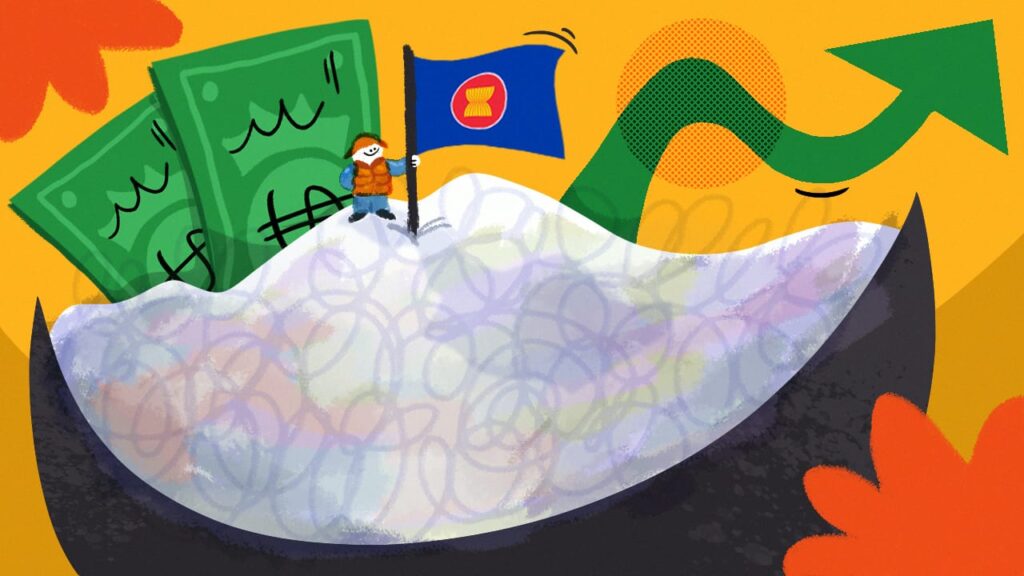
In recent years, the agriculture and fisheries sectors of several Association of Southeast Asian Nations (ASEAN) member states have undergone significant transformations. The significant improvement in food security in the region is due to increased agricultural productivity and output, healthy gross domestic product (GDP) growth, and substantial rises in farmer incomes. Food security entails the condition where the state and its citizens consistently possess the physical, social, and economic means to access enough safe and nutritious food that meets their dietary needs and preferences for an active and healthy life.
Despite the remarkable progress experienced by some of its member states, ASEAN still faces several crises that can lead to food insecurity. Food insecurity occurs when people do not have adequate physical, social, or economic access to food. Various contribute to this, such as natural disasters, domestic crop failures, and economic downturns.
The October 2023 edition of the Agricultural Market Information System (AMIS) Market Monitor noted occurrences in commodity markets, including an increase in rice prices due to India’s July 2023 export ban on non-basmati rice. This raised concerns that other countries, such as Myanmar and the Philippines, may also impose trade restrictions. The ongoing El Niño effect has also disrupted rice production in key Asian suppliers, thus contributing to the price increase.
To maintain food security, Association of Southeast Asian Nations (ASEAN) leaders have committed to ensuring the continued flow of agricultural products and avoiding “unjustified” trade barriers. Surging rice prices around the world also led to higher inflation. To address this issue, the ASEAN agriculture ministers have prioritized food supplies to member countries and considered price caps. This is good news for countries struggling with inflation such as Malaysia, Indonesia, and the Philippines.

Beyond domestic responses, ASEAN member states have laid the groundwork for further progress by creating regional frameworks to address food security. For example, the ASEAN Plus Three Emergency Rice Reserve (APTERR), a regional cooperation, was established under the APTERR Agreement signed by the ASEAN Plus Three Ministers of Agriculture and Forestry at the 11th ASEAN Ministers of Agriculture and Forestry (AMAF) Meeting on October 7, 2011 in Jakarta, Indonesia. The ASEAN ministers also met with the agriculture ministers of China, Japan, and South Korea at the 45th AMAF meeting in Kuala Lumpur, Malaysia. In a joint news statement issued after the meeting, ASEAN ministers commended these three countries for their combined contribution of more than 10,000 tons of rice to enhance APTERR.
In addition, ASEAN has also adopted the ASEAN Integrated Food Security (AIFS) Framework. This framework focuses on a series of strategic measures based on strong commitment and ownership among all ASEAN member states, and aims to ensure long-term food security and improve the livelihoods of ASEAN farmers. In addition, it aims to reduce hunger, food insecurity, and malnutrition.
ASEAN member states provide priority assistance to each other during periods of rising rice prices caused by inflation. Member states were able to overcome food shortages and manage the impact of price fluctuations with this mutual assistance. The strength of regional cooperation in addressing food security issues is demonstrated by the solidarity of ASEAN members in assisting during difficult times.
In conclusion, ASEAN’s various initiatives and strategies demonstrate its commitment to addressing food shortages. ASEAN seeks to ensure a stable and sufficient food supply for its member states by establishing mechanisms such as APTERR and adopting the AIFS Framework. Through these measures, ASEAN is getting closer to reaching sustainable food security in the region.

About the Writer
Hi everybody! I am Aufa Rahadatul Aisy, also called Aufa. I am currently working as a volunteer writer at AYO Post. I am an aspiring writer with a passion for storytelling, and a strong desire to make a positive impact in the world. With a background in International Relations, I have always been passionate about understanding the global dynamics and fostering cooperation among nations. I believe that through my unique blend of skills and interests, I can play a meaningful role in fostering understanding and cooperation among diverse communities. Nice to meet you, everyone!

About the Artist
Nadya is one of the graphic artists from the multimedia team on AYO Post. Being a recent graduate from Leeds Arts University with an upper second-class honours degree in BA (Hons) Illustration, Nadya’s works consist of bright and funky shapes that are exploding with personality. In her free time, you can find Nadya editing videos, going on walks, and perfecting her knock-knock jokes.
Noodlemagazine There is definately a lot to find out about this subject. I like all the points you made